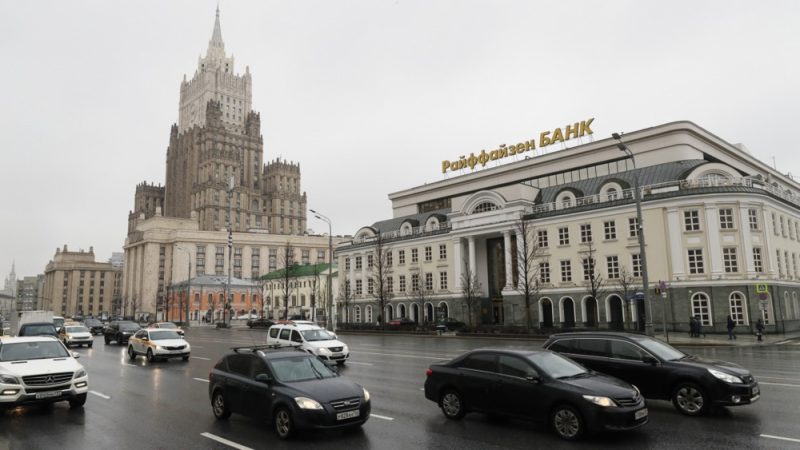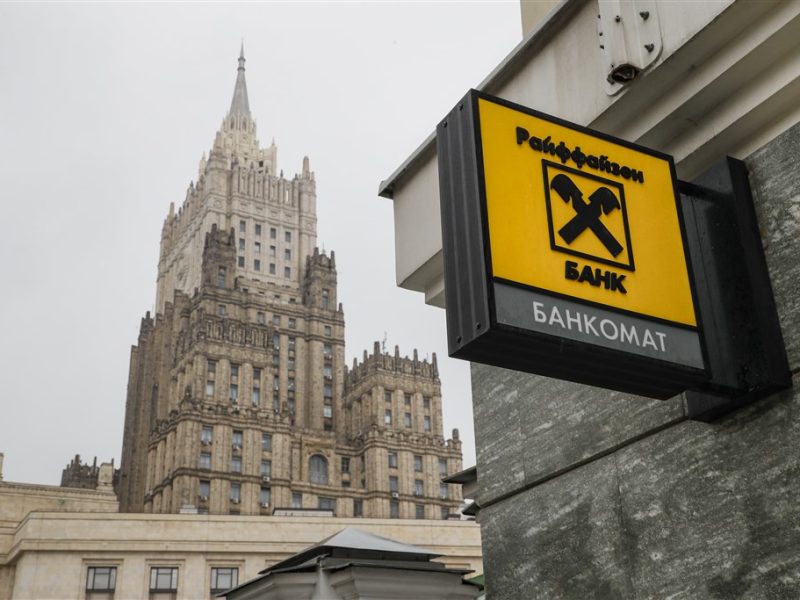For more than four months, U.S. envoys had been sending increasingly loud warnings to Austria’s Raiffeisen Bank International to scrap a deal they said had ties to one of Russia’s most powerful oligarchs. In May, Washington’s patience ran out.
In a written ultimatum received by the bank, its regulator the European Central Bank and the Austrian government on May 8, Washington threatened to restrict Raiffeisen’s access to the dollar. According to a person who has seen the letter, it could mean a death sentence for the largest Western lender in Russia.
Within hours, Raiffeisen had cancelled the deal announced in December, but the damage had already been done: by pushing Washington to the limit, the seeds of mistrust had been sown, an insider said.
Now, almost two months later, pressure is mounting on the bank to ease ties with Russia, from both Washington and the ECB, three insiders said.
Raiffeisen and Austria are at the forefront of a global effort by the United States to isolate Russia by tightening sanctions on banks and cutting off access to Western goods, more than two years after the country invaded Ukraine.
Reuters spoke to more than a dozen people, including senior officials involved in talks with regulators in the United States, Austria and Europe, as well as sources with direct knowledge of the bank’s strategy.
The interviews show that the company is still under international pressure to pull out of Russia, despite having pulled out of a deal to buy a stake in Austrian construction company Strabag, which the U.S. Treasury Department said belonged to sanctioned Russian businessman Oleg Deripaska in May.
Deripaska told Reuters the US reaction to the deal was “nonsense” and a spokesman for the businessman reiterated that “Deripaska had zero interest in Strabag at this point”.
The interviews also show that Raiffeisen failed to heed warnings from European regulators more than a year ago that the company was playing a risky game with Washington regarding its business in Russia.
Washington has not withdrawn its threat of a fine for Raiffeisen and continues to closely monitor the bank, its relations with Russia and possible sanctions violations, two people familiar with the matter said.
If Raiffeisen was willing to strike a deal that links Washington to Deripaska, who is accused by the United States of participating in a Kremlin-backed campaign to interfere in the 2016 presidential election, it could take other risks, the insider said.
A Raiffeisen spokesman said exchanges with the US Treasury Department over Russia had been “generally friendly” and that it was continually reducing its exposure to the country.
The U.S. Treasury Department declined to comment for this story.
Washington has the power to fine or cut off dollar-denominated banks that violate sanctions. For example, French bank BNP Paribas was fined $9 billion in 2014 for violating U.S. sanctions against Sudan, Iran and Cuba.
“Raiffeisen and Austria are playing with fire,” said Nina Tomaselli, an Austrian lawmaker from the Greens, part of the country’s governing coalition. “Whether we like it or not, America has the whip.”
‘Flying blind’
While many Western governments shunned Russia, some Austrian politicians were reluctant to cut ties with a country still thanked for allowing Austria to re-establish itself in 1955 after World War II. In return, Austria promised to remain neutral.
Austria remains heavily dependent on Russian gas, while Vienna serves as a hub for money from Russia and its former Soviet neighbors through a financial network built up after the fall of communism.
But Raiffeisen’s European regulators want immediate action. ECB officials attended a meeting of the bank’s supervisory board in June to urge the lender to act quickly, and the regulator has demanded that the bank outline in the coming weeks what steps it will take, according to one of the people with knowledge of the process.
A senior international regulator said the aborted Strabag deal had soured relations with the bank’s ECB supervisors, who saw Raiffeisen as dishonest. Regulators also worry they are “flying blind” because they know too little about Raiffeisen’s Russian activities, a second person said.
Raiffeisen said the bank has reduced the volume of loans and payments in Russia and is taking measures to reduce deposits, of which the bank has 14 billion euros ($15 billion) there.
The ECB declined to comment for this story.
With extensive industrial interests, more than 18 million customers from Vienna to Moscow and 44,000 employees, Raiffeisen is a financial hub for Austria and much of Eastern Europe.
Russia has become an even bigger source of money for the bank since the start of the war in Ukraine in 2022, accounting for about half of the group’s profit in the first three months of this year as the cost of making payments abroad has soared.
Still, the US Treasury Department’s threat to take Raiffeisen down continues to resonate deeply with management, a person familiar with the bank’s thinking said, adding that such a move would be “fatal” in part because large companies that use the bank for international payments would leave.
According to one of the insiders in the American way of thinking, the American authorities are aware of the serious consequences such a move would have for Raiffeisen and the possible consequences for the broader financial system and are therefore proceeding cautiously.
Prepare for the worst
That’s why Washington would prefer to see European regulators force the bank to ease its ties with Russia, according to two people with direct knowledge of the process.
But European efforts to rein in Raiffeisen as part of measures to strangle the Russian economy after Moscow’s invasion of Ukraine have been mixed.
In the first months of 2023, the ECB and European regulators at the Single Resolution Board, an authority that resolves troubled banks, discussed various scenarios for Raiffeisen if it got into trouble, two insiders said.
The talks, which have not been previously reported, prompted a discussion between the officials and Raiffeisen about preparing a plan to deal with an existential crisis that could be triggered by a US penalty.
The U.S. Treasury Department’s sanctions enforcement agency, the Office of Foreign Assets Control (OFAC), had opened an investigation into Raiffeisen’s Russian activities in early 2023.
According to one of those sources, regulators were exploring a possible breakup of the bank, but in talks with Raiffeisen the bank was reluctant to draw up a plan for a controlled liquidation in an emergency. They had the support of Austrian officials who feared that such a discussion could cause panic if it leaked.
Talks broke down in March 2023 when two U.S. banks and Credit Suisse went bankrupt, diverting regulators’ attention, the source said.
Raiffeisen said it terminated the Strabag deal when regulatory conditions were not met, that no money changed hands and that it did not consider its access to the U.S. financial system to be at risk.
The Single Resolution Board and the Austrian Ministry of Finance declined to comment on the 2023 talks.
‘Looking for loopholes in the law’
While European Union countries are collectively forging sanctions against Russia, it is up to countries to enforce them. In Austria, several ministries and authorities are responsible for monitoring and enforcing sanctions.
Austrian officials from various government agencies privately advised Raiffeisen not to go ahead with the deal with Strabag, but according to three sources familiar with the matter, the deal went ahead anyway.
According to an official, it is difficult to enter into discussions in Austria with Raiffeisen, which is part of a powerful group with roots in alpine agriculture and has great political influence.
Austria’s central bank, which has the power to freeze assets, said it was up to banks themselves to ensure transactions did not breach sanctions.
“We have a lot of legislation, but enforcement is extremely weak. If countries have an economic interest, that often prevails,” said Sophia in’t Veld, a European Union lawmaker who helped pass sanctions rules.
Russia has made it clear that it wants Western banks like Raiffeisen to stay, which could make it difficult for them to get permission to leave – and get their money out.
Italian bank UniCredit, which also has a presence in Russia, albeit to a smaller extent than Raiffeisen, has filed a legal challenge against the ECB over the central bank’s efforts to force it out of Russia.
According to one of the sources, Raiffeisen has around €5 billion of capital tied up in Russia, and the Strabag deal was intended to free up $1.5 billion of that.
The bank has repeatedly said it plans to leave Russia, but has not said when that might happen.
“Instead of withdrawing from Russia, Raiffeisen has spent more than two years looking for loopholes to get his money out,” said Austrian MP Tomaselli.


